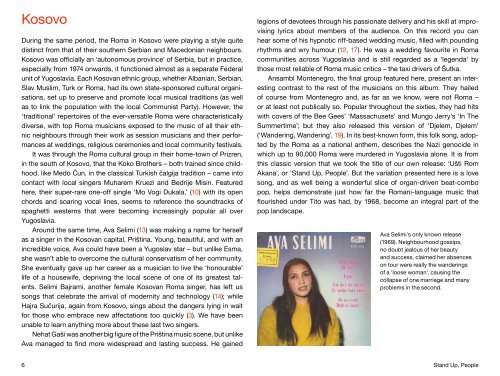gypsy pop songs from tito's yugoslavia 1964 â 1980 - Asphalt Tango
gypsy pop songs from tito's yugoslavia 1964 â 1980 - Asphalt Tango
gypsy pop songs from tito's yugoslavia 1964 â 1980 - Asphalt Tango
Create successful ePaper yourself
Turn your PDF publications into a flip-book with our unique Google optimized e-Paper software.
Kosovo<br />
During the same period, the Roma in Kosovo were playing a style quite<br />
distinct <strong>from</strong> that of their southern Serbian and Macedonian neighbours.<br />
Kosovo was officially an ‘autonomous province’ of Serbia, but in practice,<br />
especially <strong>from</strong> 1974 onwards, it functioned almost as a separate Federal<br />
unit of Yugoslavia. Each Kosovan ethnic group, whether Albanian, Serbian,<br />
Slav Muslim, Turk or Roma, had its own state-sponsored cultural organisations,<br />
set up to preserve and promote local musical traditions (as well<br />
as to link the <strong>pop</strong>ulation with the local Communist Party). However, the<br />
‘traditional’ repertoires of the ever-versatile Roma were characteristically<br />
diverse, with top Roma musicians exposed to the music of all their ethnic<br />
neighbours through their work as session musicians and their performances<br />
at weddings, religious ceremonies and local community festivals.<br />
It was through the Roma cultural group in their home-town of Prizren,<br />
in the south of Kosovo, that the Koko Brothers – both trained since childhood,<br />
like Medo Č un, in the classical Turkish čalgija tradition – came into<br />
contact with local singers Muharem Kruezi and Bedrije Misin. Featured<br />
here, their super-rare one-off single ‘Mo Vogi Dukala,’ (10) with its open<br />
chords and soaring vocal lines, seems to reference the soundtracks of<br />
spaghetti westerns that were becoming increasingly <strong>pop</strong>ular all over<br />
Yugoslavia.<br />
Around the same time, Ava Selimi (13) was making a name for herself<br />
as a singer in the Kosovan capital, Priština. Young, beautiful, and with an<br />
incredible voice, Ava could have been a Yugoslav star – but unlike Esma,<br />
she wasn’t able to overcome the cultural conservatism of her community.<br />
She eventually gave up her career as a musician to live the ‘honourable’<br />
life of a housewife, depriving the local scene of one of its greatest talents.<br />
Selimi Bajrami, another female Kosovan Roma singer, has left us<br />
<strong>songs</strong> that celebrate the arrival of modernity and technology (14); while<br />
Hajra Suč urija, again <strong>from</strong> Kosovo, sings about the dangers lying in wait<br />
for those who embrace new affectations too quickly (3). We have been<br />
unable to learn anything more about these last two singers.<br />
Nehat Gaši was another big figure of the Priština music scene, but unlike<br />
Ava managed to find more widespread and lasting success. He gained<br />
legions of devotees through his passionate delivery and his skill at improvising<br />
lyrics about members of the audience. On this record you can<br />
hear some of his hypnotic riff-based wedding music, filled with pounding<br />
rhythms and wry humour (12, 17). He was a wedding favourite in Roma<br />
communities across Yugoslavia and is still regarded as a ‘legenda’ by<br />
those most reliable of Roma music critics – the taxi drivers of Šutka.<br />
Ansambl Montenegro, the final group featured here, present an interesting<br />
contrast to the rest of the musicians on this album. They hailed<br />
of course <strong>from</strong> Montenegro and, as far as we know, were not Roma –<br />
or at least not publically so. Popular throughout the sixties, they had hits<br />
with covers of the Bee Gees’ ‘Massachusets’ and Mungo Jerry’s ‘In The<br />
Summertime’; but they also released this version of ‘Djelem, Djelem’<br />
(‘Wandering, Wandering’, 19). In its best-known form, this folk song, adopted<br />
by the Roma as a national anthem, describes the Nazi genocide in<br />
which up to 90,000 Roma were murdered in Yugoslavia alone. It is <strong>from</strong><br />
this classic version that we took the title of our own release: ‘Ušti Rom<br />
Akana’, or ‘Stand Up, People’. But the variation presented here is a love<br />
song, and as well being a wonderful slice of organ-driven beat-combo<br />
<strong>pop</strong>, helps demonstrate just how far the Romani-language music that<br />
flourished under Tito was had, by 1968, become an integral part of the<br />
<strong>pop</strong> landscape.<br />
Ava Selimi's only known release<br />
(1969). Neighbourhood gossips,<br />
no doubt jealous of her beauty<br />
and success, claimed her absences<br />
on tour were really the wanderings<br />
of a 'loose woman', causing the<br />
collapse of one marriage and many<br />
problems in the second.<br />
6 Stand Up, People



